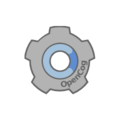OpenCog
 Open Source Artificial Intelligence | |
| Original author(s) | OpenCog Developers |
|---|---|
| Developer(s) | OpenCog Foundation |
| Initial release | 21 January 2008[1] |
| Repository | |
| Written in | C++, Python, Scheme |
| Platform | GNU/Linux |
| Type | Strong Artificial Intelligence |
| License | GNU AGPLv3 |
| Website | opencog |
OpenCog is a project that aims to build an open source artificial general intelligence (AGI) framework. OpenCog Prime is a specific set of interacting components designed to give rise to human-equivalent artificial general intelligence. OpenCog Prime's design is primarily the work of Ben Goertzel, but the OpenCog framework is intended as a generic framework for AGI research. OpenCog is released under the terms of the AGPL licence.
Origin
OpenCog was originally based on the release in 2008 of the source code of the proprietary "Novamente Cognition Engine" (NCE) of Novamente LLC. The original NCE code is discussed in the PLN book (ref below). Ongoing development of OpenCog is supported by Artificial General Intelligence Research Institute (AGIRI), the Google Summer of Code project, and others.
Components
OpenCog consists of:
- An API to manipulate an extended hypergraph of terms and relationships, dubbed the "AtomSpace".
- An implementation of a probabilistic reasoning engine based on probabilistic logic networks (PLN).
- A probabilistic genetic program evolver called Meta-Optimizing Semantic Evolutionary Search, or MOSES, originally developed by Moshe Looks.
- An attention allocation system based on economic theory.
- An embodiment system for interaction and learning within virtual worlds.
- A natural language input system consisting of Link Grammar and RelEx, both of which employ AtomSpace-like representations for semantic and syntactic relations.
- A natural language generation system called SegSim, with implementations NLGen and NLGen2.
Relation to Singularity Institute
In 2008, the Singularity Institute for Artificial Intelligence (SIAI) sponsored OpenCog, resulting in a part time post-doc Joel Pitt and a full time system engineer. Many contributions from the open source community have been made since due to OpenCog's involvement in the Google Summer of Code in 2008 and 2009. Currently the SIAI no longer supports OpenCog.[2]
See also
Sources
- Hart, D (2008). OpenCog: A Software Framework for Integrative Artificial General Intelligence (PDF). Proceedings of the First AGI Conference.
{{cite conference}}: Cite has empty unknown parameters:|booktitle=,|month=, and|conferenceurl=(help); Unknown parameter|coauthors=ignored (|author=suggested) (help) Gbooks
- Goertzel, B., Iklé, M., Goertzel, I.F., Heljakka, A. Probabilistic Logic Networks, A Comprehensive Framework for Uncertain Inference, Springer, 2009, VIII, 336 p., Hardcover ISBN 978-0-387-76871-7
References
- ^ "OpenCog Release". 21 January 2008. Retrieved 21 January 2008.
- ^ Ben Goertzel (2010-10-29). "The Singularity Institute's Scary Idea (and Why I Don't Buy It)". Retrieved 2011-06-24.
{{cite web}}: Unknown parameter|blog=ignored (help)
External links
- Official website
- Official wiki
- CyberTech News[dead link]Template:Wayback
- OpenCog blog
- Video - OpenCog: An Open Source Software Framework & A Design & Vision for Advanced AGI. Given at Monash University Australia, Sept 2011.
- Video introduction to OpenCog by Ben Goertzel. Ben speaks on OpenCog in Tai Po, Hong Kong - Dec 2011 about AGI
- Another Video introduction to OpenCog by Ben Goertzel.
